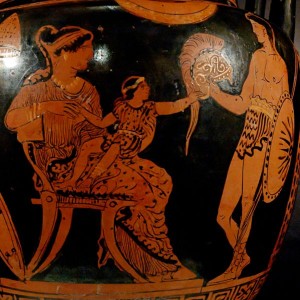Click here for direct link to audio Episode #21. 
Click here for previous episodes.
The parting of Hector and Andromache ranks as one of the most touching scenes in literary history, if not the most. In Book 6 of The Iliad, before going on to the battlefield for the last time, Prince Hector says goodbye to his tearful wife, Andromache, and their son Astyanax. When Hector approaches, the baby screams with fear at the sight of the bronze helmet with its horsehair crest. Both mother and father burst into laughter at the sight. The deep tragedy of their situation is cut through with this stroke of humanity.
Homer is not on the side of the Greeks or on the side of the Trojans. Homer is on the side of humanity and wants us to feel the pain of war. Andromache, for thousands of years, has been the epitome of the loving wife. Her sad plea for Hector to remain with them is for naught. He must go out to fight. Though she has lost both parents and all of her brothers to war, Andromache has two more loved ones to lose. Hector, of course, is killed in a mad rage by Achilles, and Astyanax is ripped from his mother’s arms and thrown from the walls of Troy by the Greek soldiers. 
The most touching moments in The Iliad bloom up from scenes involving the Trojan royal household. Walk with me through Book 6 & Book 22 of The Iliad to sample the literary techniques Homer uses to take us to the war inside the hearts and minds of the non-soldiers, from the dutiful maidservant to playboy Prince Paris. Have tissues handy!


